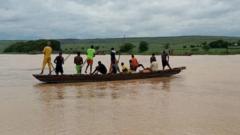Political analysts weigh in on the implications of this coalition for the upcoming 2027 elections amidst internal challenges facing the opposition.
A New Coalition Forms in Nigeria's Political Landscape as Major Leaders Unite

A New Coalition Forms in Nigeria's Political Landscape as Major Leaders Unite
Heavyweights Peter Obi and Atiku Abubakar strategically join the African Democratic Congress to challenge ruling President Bola Tinubu's party.
The political dynamics in Nigeria have been radically altered as two prominent opposition figures, Atiku Abubakar and Peter Obi, have announced their departure from their respective parties, the Peoples Democratic Party (PDP) and the Labour Party (LP), to join the African Democratic Congress (ADC). This significant shift signals one of the most consequential transformations in Nigerian politics since the end of military governance in 1999.
Abubakar and Obi’s move appears to be a strategic coalition aimed at consolidating their influence for the 2027 elections against President Bola Tinubu, who secured his position in the 2023 election with only 37% of the votes, benefiting from a divided opposition. The establishment of the ADC stems from discussions focused on unifying their voter base to prevent a similar split in the upcoming elections.
Interim chairman of the ADC, David Mark, emphasized the necessity of establishing this new party to preserve Nigeria’s democratic fabric and counteract the risk of evolving into a one-party state. This merger also coincides with ongoing crises within both the PDP and LP, which some analysts suggest are exacerbated by external manipulation.
Political expert Shehu Iliyasu observed that both Abubakar and Obi are significantly motivated by their near successes in the 2023 elections, believing they could form a winning ticket if they collaborated. The duo is now positioned as central figures in the ADC, with Abubakar—a seasoned politician—likely to pursue his fifth presidential bid.
Looking ahead, political predictions indicate that this coalition, which also includes figures like former Senate President David Mark and ex-Tinubu ally Nasir El-Rufai, may enhance their chances against the incumbent president. Analyst Ben Kenneth expressed optimism, noting that their combined efforts represent a more formidable challenge compared to the 2023 electoral split.
In contrast, some analysts like Sani Hamisu argue that Tinubu’s incumbency might offer him an advantage in securing a second term, given the historically rare occurrence of leaders losing their reelection bids in Nigeria.
On the other side, the ruling All Progressives Congress (APC) remains dismissive of the new coalition, with acting chairman Ali Bukar Dalori remarking that the ADC lacks genuine threats to their stronghold on power.
Responses from the existing opposition parties indicate a refusal to join forces with the ADC, particularly as the PDP has signaled its intent to independently confront the APC while the LP maintains loyalty to its current direction.
As the political landscape in Nigeria evolves, all eyes will be on the developing coalition's effectiveness and the strategies they employ as the 2027 elections approach.
Abubakar and Obi’s move appears to be a strategic coalition aimed at consolidating their influence for the 2027 elections against President Bola Tinubu, who secured his position in the 2023 election with only 37% of the votes, benefiting from a divided opposition. The establishment of the ADC stems from discussions focused on unifying their voter base to prevent a similar split in the upcoming elections.
Interim chairman of the ADC, David Mark, emphasized the necessity of establishing this new party to preserve Nigeria’s democratic fabric and counteract the risk of evolving into a one-party state. This merger also coincides with ongoing crises within both the PDP and LP, which some analysts suggest are exacerbated by external manipulation.
Political expert Shehu Iliyasu observed that both Abubakar and Obi are significantly motivated by their near successes in the 2023 elections, believing they could form a winning ticket if they collaborated. The duo is now positioned as central figures in the ADC, with Abubakar—a seasoned politician—likely to pursue his fifth presidential bid.
Looking ahead, political predictions indicate that this coalition, which also includes figures like former Senate President David Mark and ex-Tinubu ally Nasir El-Rufai, may enhance their chances against the incumbent president. Analyst Ben Kenneth expressed optimism, noting that their combined efforts represent a more formidable challenge compared to the 2023 electoral split.
In contrast, some analysts like Sani Hamisu argue that Tinubu’s incumbency might offer him an advantage in securing a second term, given the historically rare occurrence of leaders losing their reelection bids in Nigeria.
On the other side, the ruling All Progressives Congress (APC) remains dismissive of the new coalition, with acting chairman Ali Bukar Dalori remarking that the ADC lacks genuine threats to their stronghold on power.
Responses from the existing opposition parties indicate a refusal to join forces with the ADC, particularly as the PDP has signaled its intent to independently confront the APC while the LP maintains loyalty to its current direction.
As the political landscape in Nigeria evolves, all eyes will be on the developing coalition's effectiveness and the strategies they employ as the 2027 elections approach.



















